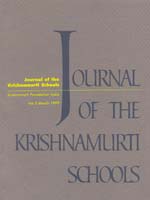Issue 3 - March 1999

- Written by J. Krishnamurti
Live not by intellect alone; for that way leads to perversion, the mechanization of life.
- Written by Ahalya Chari
The third volume of the Journal goes out to readers a few months earlier this time.
- Written by Radhika Herzberger
The spirit of nationalism was hovering in the Indian air when J. Krishnamurti was born in 1895.
- Written by O. R. Rao
One of the persistent and nagging concerns of the Krishnamurti schools seems to be that of 'locating the place of academics in the total vision of education'.
- Written by Colin Foster
This a reflection on the attempt we are making at Brockwood to put into practice the educational intentions of Krishnamurti.
- Written by Rajesh Dalal
Sreedhar (S): Rajesh, for over two decades, you have been associated with the schools Krishnamurti founded in India.
- Written by Gabriel Arquilevich
A few years ago I attended some major teacher conferences and came away with a deep sense of unease.
- Written by Sunder Gandikota
Having been a professional in the manufacturing industry for some years, I have observed that a professional is liked by those who have gone beyond the profession and developed a deeper relationship with all around.
- Written by Jane Sahi
There is a Sufi story told of how a poor farmer had journeyed to Delhi to beg for some financial help from the great Sufi Saint Hazrat Nizamuddin Aulia.
- Written by Usha Mukunda
At Centre For Learning, we have an open library. Open, available, accessible, friendly and welcoming to the users.
- Written by Ananthapadmanabhan
As a teacher who has spent over ten years teaching senior school students in those tumultuous years when they are growing up, facing the pressures of a performance-dominated society, I have time and again returned to the question of the place of the larger vision of education - of this whole concern with the art of living correctly - in my class.
- Written by Alok Mathur
Geography began with the realization that there was another side to the mountain and other people across the sea.
- Written by Patrick Foster
The following three pieces have been received in response to David Moody's article: 'The Insight Curriculum', which appearedin Volume 2 of the journa1, July 1998.
- Written by Shashidhar Jagadeeshan
I would like to begin by thanking David Moody for writing his interesting article, thus giving me an opportunity to note down some of my thoughts on the nature of insight.
- Written by Ananthapadmanabhan
The greatest challenge facing a science teacher (I have been one for more than a decade now) is this whole matter of the student's intuition.
- Written by Vedavathi Mohan
Working with children on a project has been a most rewarding experience.
- Written by Nick Short
It seems that more and more governments today, democratic ones at least, are claiming to have education at the top of their priority lists.
- Written by Divya
Krishnamurti has often spoken about all our schools being one.
- Written by Kamala V. Mukunda
The question asked most often by visitors to the Centre For Learning is, '...but how do your children manage in the Real World outside, when they leave this school?' There was a time when this question would perplex me - isn't CFL in the real world just as everything else?! But over the last few years, I have begun to think more about this issue, and I can see that there is a need to answer such a question in depth and with seriousness.
- Written by Khusro Kidwai
The author has known Eklavya for many years through his parents and teachers, and through Eklavya's children's magazine 'Chakmak'.
- Written by Fritjof Capra
To meet the challenge of the twenty-first century we need to buildeducation on the foundation of eco-literacy.
- Written by Geetha Iyer
In December 1998, Navadanya and Rishi Valley School jointly organized a workshop on bio-diversity and conservation issues.
- Written by Leading Scientists
Human beings and the natural world are on a collision course.
- Written by P. Ramesh
Is history only a study of what happened' and when, and what happened next?
- Written by P. Ramesh
Resurgence is a magazine published every two months from Cornwall, U.K.

